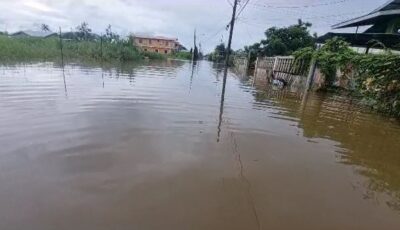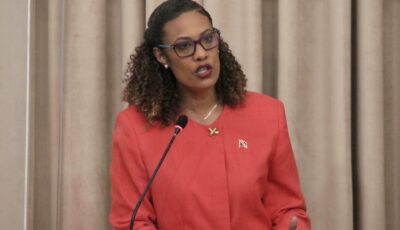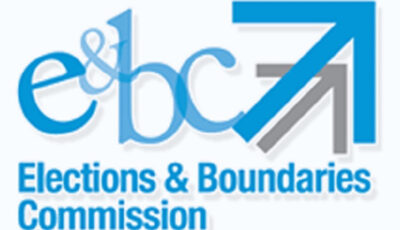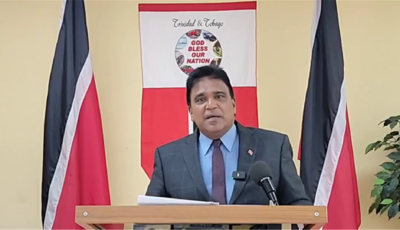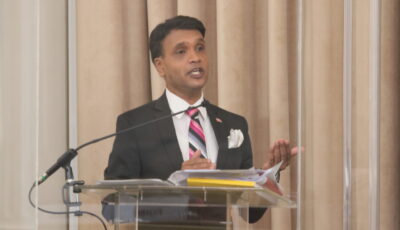Minister Dookeran address at the OAS’ Plenary Session
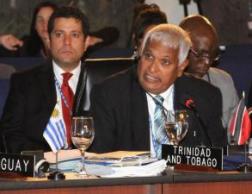
Minister of Foreign Affairs, the Honourable Winston Dookeran and Ambassador to the United States, Neil Parsan looking on
Let me first of all express our deep appreciation for the hospitality and arrangements of the Government of Guatemala in organising this very significant meeting here.
May I also say how pleasant it is to be in Antigua, what I am told is the third capital of Guatemala and sometimes referred to as the “Very Noble and Very Loyal” place.
Mr. President, the theme for this year’s Assembly deliberations, “For a Comprehensive Policy against the World Drug Problem in the Americas”, is indeed a significant development and the Government of Trinidad and Tobago has been combatting this issue, as all of us have been doing in many parts of our hemisphere. The issue of the trafficking of illegal drugs, the dysfunctional use of both legal and illegal substances with the significant increases in crime, social deterioration and indeed insecurity are fundamental to the governance of our country. Security and citizens’ safety is indeed a primary function of government.
I therefore wish to concur with you, as Minister of Foreign Affairs, on the significance and timeliness of this theme that you have selected for debate, because it is consistent with discussions that took place not only in the Summit of the Americas in Colombia but your President, Pérez Molina, has made this an issue of high priority and rightly so.
In the Caribbean region, the Prime Minister of Trinidad and Tobago, the Honourable Kamla Persad-Bissessar, is the Chair of the Security sub-committee on regional affairs and therefore it is of special significance to us that we are debating these issues.
We have been attempting to design an architecture for national security on a regional basis and this has been based on three main pillars – one has to do with the Caribbean Basin Security Initiative which was initiated by the United States and indeed we have received very significant support from Canada and the United Kingdom and we want to acknowledge that support.
Secondly, the CARICOM Governments have adopted a regional security plan with an expressed purpose of developing a comprehensive expansion of the security infrastructure as we strengthen our existing arrangements and propose innovative programmes and at the same time bring to bear the necessary apparatus that is required to deal with this problem.
And thirdly, Mr. Chairman, we are very happy that Trinidad and Tobago, among sixty−seven (67) countries who signed on the first day of its opening for signature, the United Nations Arms Trade Treaty (ATT). We want to acknowledge the tremendous support that the entire global community has provided in this particular arena. We know that the issues with trade in illegal arms and ammunition is at the very heart, particularly in dealing with security issues in smaller economies, and therefore it is to our great expectation that this global Treaty will go a long way in devising a proper regulation of that trade.
Your Report – “the Drug Report in the Americas” – Mr. President is one that we would like to commend the Secretary General José Miguel Insulza and the Assistant Secretary General Ambassador Albert Ramdin of the OAS for making it a mandate in which major conclusions have been derived upon. And although the President in his opening remarks said “it is still yet to fill the gap between conclusions and recommendations, it has provided us with a fundamental basis to do so.” It is significant from our point of view that the drug report is not only in sync with the new interpretation of the problem of drugs and the drug situation in our country, but it notes and I wish to quote that “Structural problems need to be addressed with structural solutions”, we welcome that thinking.
In the case of Trinidad and Tobago, we recognise that this issue requires much more than a direct approach to the question of drug management and control and hence we have been working to establish the legislative apparatus to deal with the issues of money laundering, corruption and firearms trafficking by putting into place modern legislation such as the Financial Intelligence Unit and the Financial Obligations (Financing of Terrorism) Regulations as supplementary but important measures, in this particular regard.
Trinidad and Tobago, like so many other countries in the hemisphere and in the region, is not insulated nor are we isolated from the problems in the hemisphere. We recognise that fact and therefore the multi-faceted approach to demand reduction is welcomed. We are very pleased to have heard of the efforts that have been made elsewhere to deal with this problem.
In our case we have taken some very specific measures:
(1) The expansion of interventions in the Pre-School and Elementary school education;
(2) The establishment of Drug Treatment Courts and other rehabilitation options;
(3) The development of structured programmes based on providing marketable skills and other activities to high risk young population; and also
(4) To develop more relevant social programmes to address the issues such as family disintegration, unemployment, poverty and the lack of social support.
In other words, Mr. Chairman, our approach in dealing with this matter is multi−faceted as it combines the hard and soft issues pertaining to the drug situation and brings to the fore:
(1) The development of an architecture for regional security;
(2) The establishment of a legislative framework to deal with the wider issues, and
(3) The bringing about of innovative measures to handle the question of demand reduction.
It is therefore in this context that we welcome the hemispheric approach and the compilation of this Report – the Drug Report in the Americas and consider this initiative by the Organisation of American States as a major step, a significant step, a timely step, that will only add to the legitimacy and the relevance of this institution, its membership and for all of us, as we pursue in depth the charge for sustainable and integral development in the region.
We thank the Organisation of American States, the Government of Guatemala and all those who have made this debate a possibility.
Thank you.



